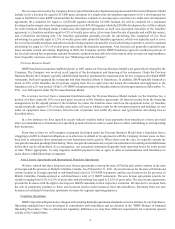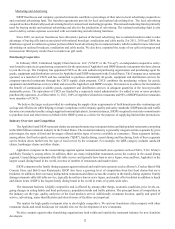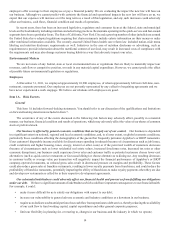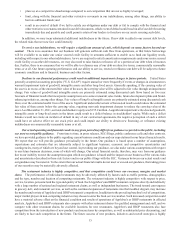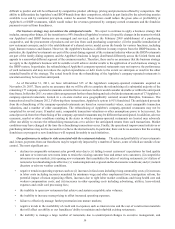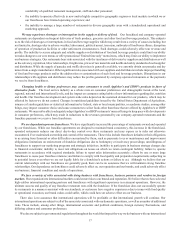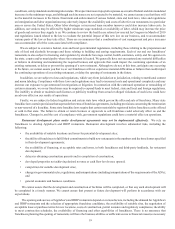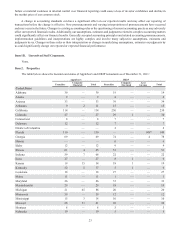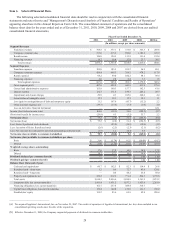IHOP 2011 Annual Report Download - page 36
Download and view the complete annual report
Please find page 36 of the 2011 IHOP annual report below. You can navigate through the pages in the report by either clicking on the pages listed below, or by using the keyword search tool below to find specific information within the annual report.18
franchisees and vendors. These include antitrust and tax requirements, anti-boycott regulations, import/export/customs regulations
and other international trade regulations, the USA Patriot Act and the Foreign Corrupt Practices Act. Failure to comply with any
such legal requirements could subject us to monetary liabilities and other sanctions, which could harm our business, results of
operations and financial condition.
Factors outside our control may harm our brands' reputations. The success of our restaurant business is largely dependent
upon brand recognition and the strength of our franchise systems. The continued success of our company-operated restaurants
and our franchisees will be directly dependent upon the maintenance of a favorable public view of the Applebee's and IHOP brands.
Negative publicity (e.g., crime, scandal, litigation, on-site accidents and injuries or other harm to customers) at a single Applebee's
or IHOP location can have a substantial negative impact on the operations of all restaurants within the Applebee's or IHOP system.
Multi-unit food service businesses such as ours can be materially and adversely affected by widespread negative publicity of any
type, but particularly regarding food quality, food-borne illness, food tampering, obesity, injury or other health concerns with
respect to certain foods, whether or not accurate or valid. The risk of food-borne illness or food tampering cannot be completely
eliminated. Any outbreak of food-borne illness or other food-related incidents attributed to Applebee's or IHOP restaurants or
within the food service industry or any widespread negative publicity regarding the Applebee's or IHOP brands or the restaurant
industry in general could harm our reputation. Although the Company maintains liability insurance, and each franchisee is required
to maintain liability insurance pursuant to its franchise agreements, a liability claim could injure the reputation of all Applebee's
or IHOP restaurants, whether or not it is ultimately successful.
We may be subject to legal proceedings that could be time consuming, result in costly litigation, require significant amounts
of management time and result in the diversion of significant operational resources. We are involved in lawsuits, claims and
proceedings incident to the ordinary course of our business. Litigation is inherently unpredictable. Any claims against us, whether
meritorious or not, could be time consuming, result in costly litigation, require significant amounts of management time and result
in the diversion of significant operational resources. There have been a growing number of lawsuits in recent years. There has
also been a rise in employment-related lawsuits. From time to time, we have been subject to these types of lawsuits. The cost of
defending claims against us or the ultimate resolution of such claims may harm our business and operating results. In addition,
the increasingly regulated business environment may result in a greater number of enforcement actions and private litigation. This
could subject us to increased exposure to stockholder lawsuits.
We and our franchisees are subject to a variety of litigation. We and our franchisees are subject to complaints or litigation
from guests alleging illness, injury or other food quality, food safety, health or operational concerns. We and our franchisees are
also subject to "dram shop" laws in some states pursuant to which we and our franchisees may be subject to liability in connection
with personal injuries or property damages incurred in connection with wrongfully serving alcoholic beverages to an intoxicated
person. We may also initiate legal proceedings against franchisees for breach of the terms of their franchise agreements, including
underreporting of sales. Such claims may reduce the profits generated by company-operated restaurants and the ability of franchisees
to make payments to us. These claims may also reduce the ability of franchisees to enter into new franchise agreements with us.
Although our franchise agreements require our franchisees to defend and indemnify us, we may be named as a defendant and
sustain liability in legal proceedings against franchisees under the doctrines of vicarious liability, agency, negligence or otherwise.
Ownership of real property exposes us to potential environmental liabilities. The ownership of real property exposes us
to potential environmental liabilities from United States federal, state and local governmental authorities and private lawsuits by
individuals or businesses. The potential environmental liabilities in connection with the ownership of real estate are highly uncertain.
We currently do not have actual knowledge of any environmental liabilities that would have a material adverse effect on the
Company. From time to time, we have experienced some non-material environmental liabilities resulting from environmental
issues at our properties. While we are unaware of any material environmental liabilities, it is possible that material environmental
liabilities relating to our properties may arise in the future.
Matters involving employees at certain company-operated restaurants expose us to potential liability. We are subject to
United States federal, state and local employment laws that expose us to potential liability if we are determined to have violated
such employment laws. Failure to comply with federal and state labor laws pertaining to minimum wage, overtime pay, meal and
rest breaks, unemployment tax rates, workers' compensation rates, citizenship or residency requirements, child labor requirements,
sales taxes and other employment-related matters may have a material adverse effect on our business or operations. In addition,
employee claims based on, among other things, discrimination, harassment or wrongful termination may divert financial and
management resources and adversely affect operations. The losses that may be incurred as a result of any violation of such
employment laws are difficult to quantify.
Our failure or the failure of our franchisees to comply with federal, state and local governmental regulations may subject
us to losses and harm our brands. We are subject to the Fair Labor Standards Act (which governs such matters as minimum
wages, overtime and other working conditions), along with the Americans with Disabilities Act, the Immigration Reform and
Control Act of 1986, various family leave mandates and a variety of other laws enacted, or rules and regulations promulgated by
federal, state and local governmental authorities that govern these and other employment matters, including tip credits, working



